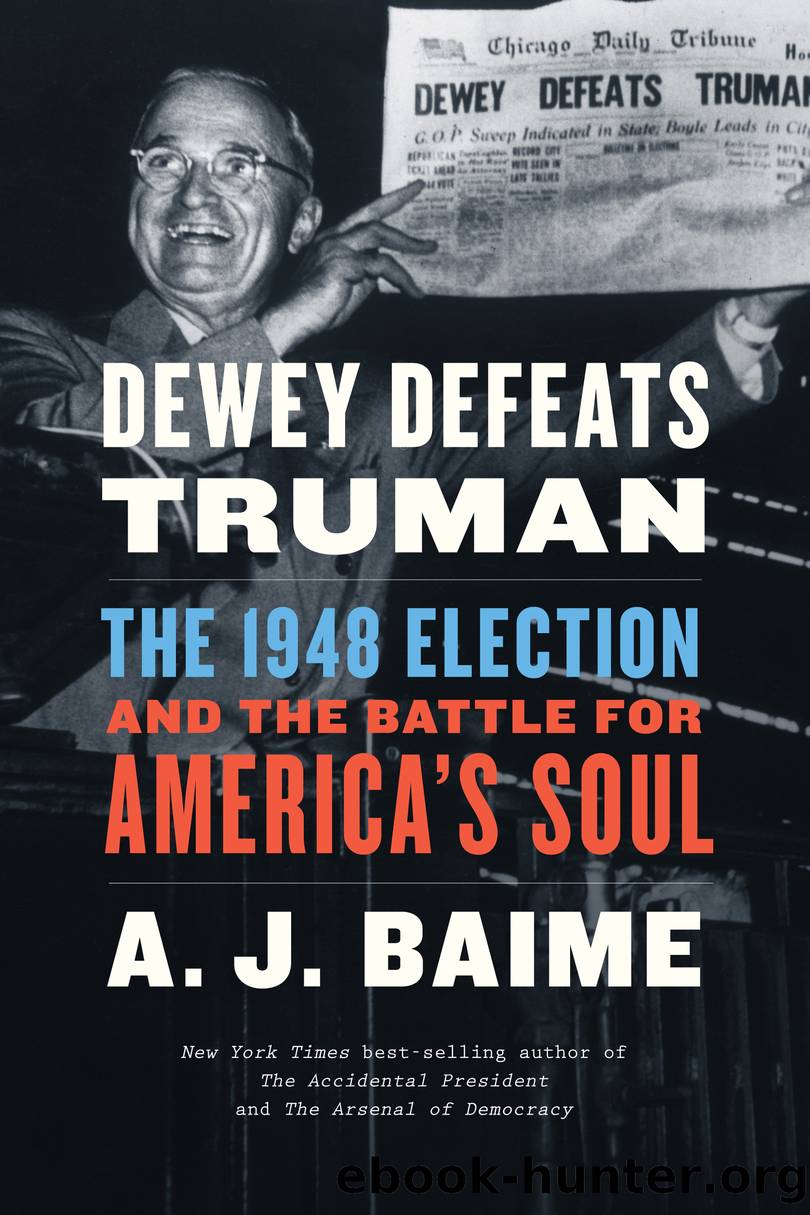Dewey Defeats Truman by A. J. Baime

Author:A. J. Baime
Language: eng
Format: epub
ISBN: 9781328588593
Publisher: HMH Books
Published: 2020-07-07T00:00:00+00:00
* * *
On the morning of September 17, the Truman Special crossed into enemy territory. Like most heavily agricultural states, Iowa was firmly Republican. The state had gone to the GOP in all but three presidential elections dating back to 1856, and had landed squarely in Thomas Dewey’s column over FDR four years earlier. Iowa had a Republican governor, and all eight congressmen and both senators were Republicans. Still, in each town where Truman stopped, he found a crowd awaiting him to hear his “rip-snorting” impromptu speeches.
The president waved peeled ears of golden corn at farmers. Local marching bands honked out crowd favorites. Swarms of motorcycle police sporting American flags revved their engines. So soon after the war, patriotism was palpable at these rallies, and the hours moved by in a montage of red, white, and blue. “It is fascinating,” Margaret wrote in her diary on this day. “We made about six stops altogether, and we eat in between.” At the station in Des Moines, the Truman Special picked up the First Lady. Porters helped Mrs. Truman get her luggage aboard; Bess settled in for what would be her first and only national presidential campaign tour.
By the end of the first week, the reality of life aboard a traveling train began to set in. “Going across the country, I imagine we were the laughing stock of the nation,” recalled one Democratic Party official, John P. McEnery. “It was like a traveling circus,” according to columnist Richard Strout, who was aboard. “Nothing in the world is remotely like the atmosphere on one of these transcontinental campaign caravans,” the columnist Marquis Childs wrote of the Truman Special. “It is a perpetual public affairs forum, a gossipy smalltown sewing circle, a traveling rodeo, the mixture being unique and completely and unmistakably American.”
The Union Pacific railroad kitchen offered surprisingly tasty fare. The menu included an à la carte breakfast: bacon and eggs ($1.25), griddle cakes with syrup ($0.50), fillet of salt mackerel, club style ($1.85). At lunch and dinner, martini and Manhattan cocktails ($0.60) and beer ($0.40) accompanied chicken à la King ($2.05) or pan-fried fillet of fish with tartar sauce ($1.80), while the gem on the dessert menu was ice cream with caramel sauce ($0.30).
The Truman family and the president’s aides fell into a routine—as much as was possible, given that the schedule called for numerous whistle-stops at different times each day, from sunrise to well into the night. “The most important function was to take part in the daily policy meetings that took place to set the policy in the campaign,” recorded Clifford. “We met every day around the dining room table on his car sometimes at breakfast, sometimes at lunch, and sometimes off and on during the day.”
The advance team led by Oscar Chapman would be out in front of Truman’s train by a day or two, and this team would funnel back information via telephone or messenger. “As an advance man,” noted Chapman, “you first try to find out from
Download
This site does not store any files on its server. We only index and link to content provided by other sites. Please contact the content providers to delete copyright contents if any and email us, we'll remove relevant links or contents immediately.
| U.K. Prime Ministers | U.S. Presidents |
Waking Up in Heaven: A True Story of Brokenness, Heaven, and Life Again by McVea Crystal & Tresniowski Alex(37002)
Empire of the Sikhs by Patwant Singh(22170)
We're Going to Need More Wine by Gabrielle Union(18072)
Hans Sturm: A Soldier's Odyssey on the Eastern Front by Gordon Williamson(16614)
Leonardo da Vinci by Walter Isaacson(11901)
The Radium Girls by Kate Moore(10906)
Educated by Tara Westover(7061)
Tools of Titans by Timothy Ferriss(6945)
How to Be a Bawse: A Guide to Conquering Life by Lilly Singh(6692)
The Last Black Unicorn by Tiffany Haddish(5073)
Permanent Record by Edward Snowden(4996)
The Rise and Fall of Senator Joe McCarthy by James Cross Giblin(4842)
Promise Me, Dad by Joe Biden(4444)
The Wind in My Hair by Masih Alinejad(4424)
The Crown by Robert Lacey(4104)
A Higher Loyalty: Truth, Lies, and Leadership by James Comey(4031)
The Iron Duke by The Iron Duke(3639)
Joan of Arc by Mary Gordon(3257)
How to be Champion: My Autobiography by Sarah Millican(3185)
